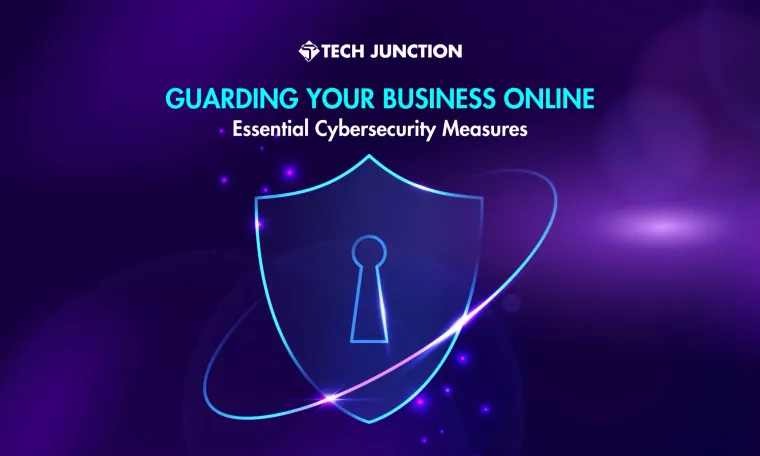The new digital age has ushered in unprecedented growth and efficiency, but it has also unveiled a shadowy world of cyber threats and vulnerabilities. Cyber threats, from data breaches to ransomware attacks, are on the rise, posing a grave danger to businesses of all sizes. Today, we find ourselves at a crossroads where ensuring cyber safety for businesses online is no longer an option—it is a matter of survival.
Cybersecurity Essentials: Understanding the Growing Threat Landscape
Cybercriminals are perpetually refining their tactics to exploit vulnerabilities, making large and small businesses their prime targets. The average data breach cost is approximately $3.86 million, as reported by IBM's 2020 Cost of a Data Breach Report. Understanding the current threat landscape is the first step toward cyber security essentials.
Data breaches
Data breaches have become too common, exposing sensitive customer information, trade secrets, and financial data. The aftermath of a data breach can be devastating, both financially and in terms of reputation.
Ransomware Attacks
In 2020, the average ransom payment increased by 60%, according to Coveware's Q4 Ransomware Marketplace report. Ransomware attacks involve encrypting a company's data and demanding a ransom for its release. These attacks can paralyze a business, resulting in significant downtime and often requiring substantial payments to cybercriminals.
Phishing Scams
Phishing scams pose a persistent threat. Cybercriminals employ fake emails, websites, or social engineering techniques to deceive individuals within an organization into divulging confidential information, such as login credentials or financial details.
Insider Threats
Insider threats, whether malicious or accidental, are a significant concern. Employees with access to sensitive information can inadvertently or intentionally compromise a business's cybersecurity.
Supply Chain Vulnerabilities
Many businesses rely on a network of suppliers and partners, which can introduce vulnerabilities. A compromise in one part of the supply chain can impact multiple businesses downstream, emphasizing the importance of a small business IT infrastructure checklist.
Evolving Cybersecurity Regulations
Governments and regulatory bodies are implementing stricter cybersecurity regulations. Non-compliance can result in hefty fines, making it essential for businesses to adhere to these standards and prioritize cybersecurity.
Top 10 Tips for Cybersecurity
Research suggests that cyberattacks are on the rise, with over 4,000 incidents reported daily. In a world where cyber security for businesses is essential, and cyber threats are constantly evolving and becoming more sophisticated, businesses must be proactive in safeguarding their digital assets. Small businesses, particularly, are vulnerable targets due to their limited resources and may not have a dedicated IT security team. According to Verizon's 2020 Data Breach Investigations Report, 43% of data breaches target small businesses.
However, implementing effective cybersecurity essentials does not have to be a daunting task. Here are the top 10 tips for cybersecurity to protect your business online:
1. Employee Training
Cybersecurity for businesses hinges on comprehensive employee training. Regularly educate your employees about cybersecurity best practices, such as recognizing and avoiding phishing attacks, protecting against malware, and being aware of social engineering tactics. This creates a cybersecurity-aware culture within your organization, which is fundamental in defending against threats.
2. Strong Password Policies
Enforcing strong password requirements is a core element of cybersecurity. This involves specifying password length, complexity rules, and regular change intervals. Consider implementing multi-factor authentication (MFA) to add an extra layer of security. Strong password policies are a foundational defense against unauthorized access.
3. Regular Software Updates
Keeping all software up to date is a crucial cybersecurity essential. Regular updates are fundamental to patching vulnerabilities that hackers could exploit. This proactive measure strengthens your organization's defense against cyber threats.
4. Firewall and Intrusion Detection
Firewalls are indispensable tools for monitoring and filtering incoming and outgoing network traffic. Intrusion detection systems (IDS) work in tandem, alerting you to suspicious activity that might indicate an unauthorized intrusion. Together, they fortify your network against cyber threats.
5. Data Encryption
Data encryption is a pivotal technique for safeguarding sensitive information and ensuring cybersecurity for businesses. It involves converting data in transit or at rest into a code that can only be decrypted with the appropriate key. This is crucial for maintaining the confidentiality and integrity of your data.
6. Access Control
Implementing stringent access control measures is a vital cornerstone of cybersecurity for businesses. This means limiting access to data and systems based on employees' roles and responsibilities. Such measures help mitigate the risk of unauthorized access and data breaches.
7. Regular Backups
Regularly conducting data backups is a key component of a small business IT infrastructure checklist. It involves creating copies of important data and storing them securely. Regularly testing the restoration process ensures that data can be effectively recovered in case of a breach or system failure, minimizing downtime.
8. Incident Response Plan
Developing and maintaining an incident response plan is fundamental to cybersecurity strategy. This plan outlines how your organization will react to security incidents, minimizing damage and reducing downtime. It's an essential part of your business's security preparedness.
9. Third-Party Security
In the realm of cybersecurity for businesses, assessing the security practices of third-party vendors and partners is essential. This ensures these external entities meet your organization's security standards and do not introduce vulnerabilities. Assess the security practices of third-party vendors and partners with access to your data. Ensure they meet your security standards and conduct due diligence in this aspect of cybersecurity for businesses.
10. Security Audits and Testing
Regularly perform security audits and penetration testing. This is a key element in the top 10 tips for cybersecurity. It helps identify vulnerabilities and weaknesses in your network and systems. Promptly addressing any issues found is essential for maintaining a robust cybersecurity posture.
A Final Word: Strengthening Cybersecurity for Businesses
In an age where the digital realm offers unprecedented opportunities, safeguarding your business online is paramount. Understanding the dynamic landscape of cybersecurity for businesses is not just advisable but imperative. We have explored critical concerns, from data breaches to phishing scams, and provided a unique set of top 10 cybersecurity tips to fortify your digital defenses. As cyber threats continually shape-shift, these measures stand as your unique shield against potential attacks.
The Tech Junction is the ultimate hub for all things technology. Whether you're a tech enthusiast or simply curious about the ever-evolving world of technology, this is your go-to portal. If you want to write for us or have any feedback feel free to email us.



